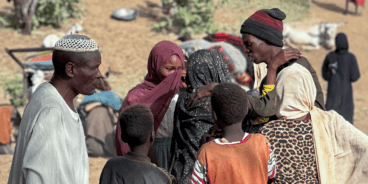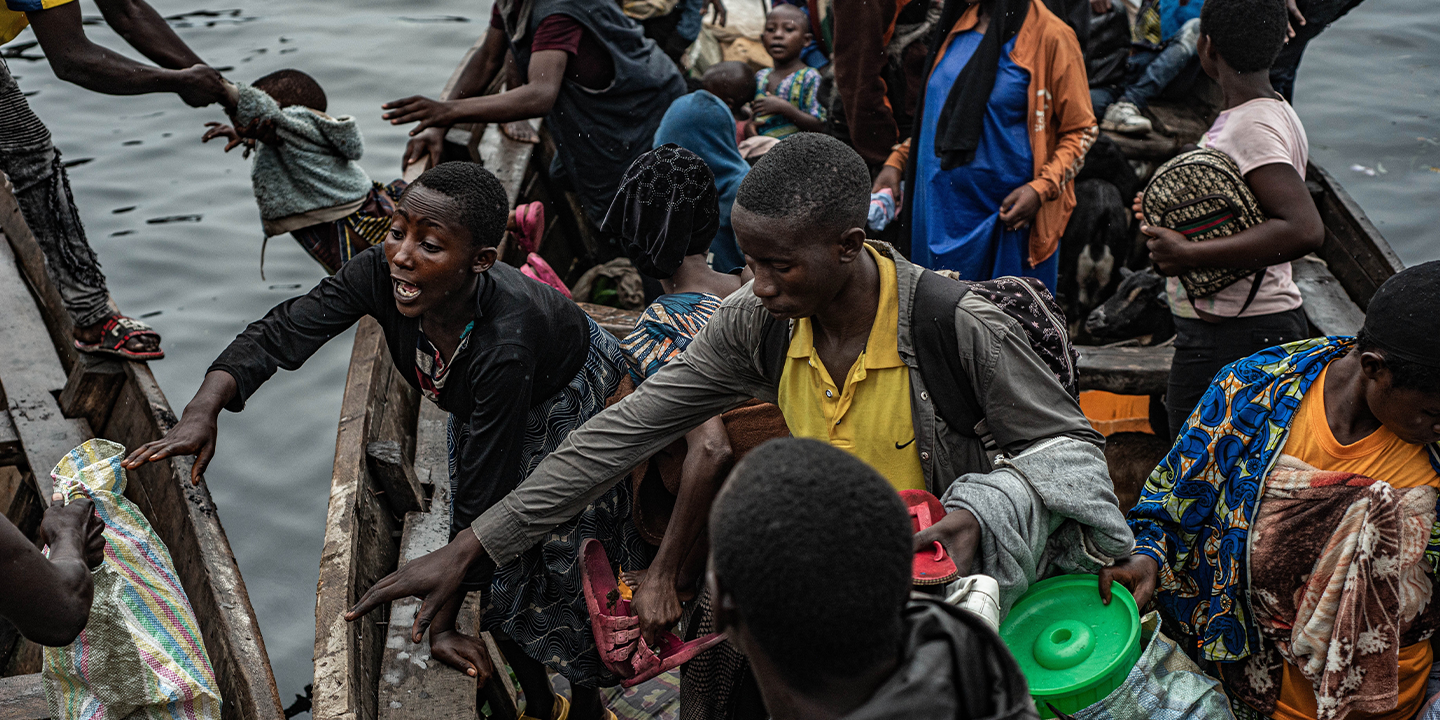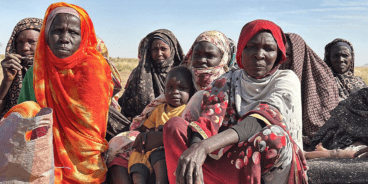

Atrocity Alert No. 426: Democratic Republic of the Congo, Israel and the Occupied Palestinian Territory and Sudan
Atrocity Alert is a weekly publication by the Global Centre for the Responsibility to Protect highlighting situations where populations are at risk of, or are enduring, mass atrocity crimes.
DIRE HUMANITARIAN NEEDS IN EASTERN DRC AMID UNILATERAL CEASEFIRE ANNOUNCEMENT
Since the March 23 Movement (M23) armed group escalated its advance in eastern Democratic Republic of the Congo (DRC) and seized Goma on 26 January, reports of indiscriminate attacks on civilians and civilian property, including shootings and looting and other human rights violations have reached alarming levels. According to the World Health Organization, 2,880 people have been injured and the remains of at least 900 people killed have been recovered as of 31 January. Heavy bombing and shelling near displacement camps forced thousands to flee once again, and the destruction of these sites forced at least 100,000 people to leave Goma in the past week alone. Local women’s organizations have reported widespread sexual violence and severe gaps in protection services.
Over the past week the humanitarian situation has deteriorated as M23 rebels set up checkpoints around Goma, severely restricting aid access and resulting in shortages of food and other essential supplies. The UN Office for the Coordination of Humanitarian Affairs warned that water, sanitation and health facilities are significantly damaged, overcrowded or lacking critical supplies. Unexploded ordnances have been reported near or in several hospitals, among other civilian areas, including non-governmental organization offices.
On 3 February the Alliance Fleuve Congo – a rebel coalition which includes M23 – declared a unilateral ceasefire for Goma shortly after the UN released new figures revealing the scale of the crisis last week. The ceasefire began on Tuesday; however, at the time of publication concerns remain over its enforcement. On 4 February the UN reported continued clashes between the government’s armed forces and M23 in several localities of South Kivu’s Kalehe territory. These clashes triggered mass displacement, exacerbating an already complex humanitarian crisis in South Kivu, with thousands of people arriving in the city of Bukavu.
In response to the deteriorating human rights situation, the UN Human Rights Council (HRC) will hold a Special Session on the crisis on 7 February, at the request of 48 member states, including the DRC government. Priscila Vazquez, DRC expert at the Global Centre for the Responsibility to Protect, said, “The HRC-mandated International Team of Experts on the DRC should provide a comprehensive update on ongoing atrocity crimes and further risks, while the HRC must strengthen the Team’s mandate and ensure that accountability mechanisms are reinforced.”
All parties should ensure safe humanitarian corridors, protect civilians and seek a peaceful resolution to the conflict, particularly by participating in good faith at this week’s joint summit, and by resuming the Luanda Process to de-escalate tensions and avoid further violence. The territorial integrity of the DRC must be respected and Rwandan forces should withdraw from the country. All parties conflict must adhere to obligations under international law.
HEIGHTENED ATROCITY RISKS IN THE WEST BANK AS ISRAEL ESCALATES VIOLENCE
On 21 January – two days after the ceasefire in Gaza came into effect – Israel launched a large-scale operation in Jenin refugee camp, which has since expanded to Tulkarem, Tubas and other areas in the Occupied West Bank. Over the last two weeks, Israel’s military assault – through airstrikes, ground incursions and demolitions – has killed at least 50 Palestinians, including a 2-year-old girl, leveled dozens of residential buildings, damaged critical infrastructure and forcibly displaced tens of thousands of Palestinians. The UN Office for the Coordination of Humanitarian Affairs warned that “once again…lethal, war-like tactics are being applied, raising concerns over the use of force that exceeds law enforcement standards,” in what may amount to war crimes.
While Israeli officials claim they are conducting a so-called counterterrorism campaign, statements by the defense minister that the Israeli military would apply the same “methods” as those used in Gaza has heightened the risk of further atrocities in the Occupied West Bank, including East Jerusalem. The UN Special Rapporteur on the human rights situation in Palestine, Francesca Albanese, referencing her October 2024 report which warned of Israel’s tactics in Gaza being mimicked in the Occupied West Bank, stressed, “Israel’s genocidal campaign moved to the West Bank during the ceasefire in Gaza and amidst the silence of the [international] community.”
Prior to the latest operations, risks to populations in Occupied West Bank had already been increasing. In 2023 Israeli forces returned to the regular use of airstrikes in the Occupied West Bank for the first time in two decades. Since 7 October 2023 the UN has recorded an increase in the number of Palestinians killed in the Occupied West Bank, as well as a surge in Israeli settler attacks and deadly raids carried out by both the Israeli military and Palestinian security forces. Such violence – left unchecked – threatens the protection of Palestinians across the Occupied Palestinian Territory.
In response to continued inaction and impunity, on 31 January nine countries announced the formation of the “Hague Group,” making a commitment to hold Israel accountable for its violations of international law, defend Palestinian rights and coordinate legal, diplomatic and economic measures against Israel.
Israel must refrain from using means and methods of warfare in the Occupied West Bank, including East Jerusalem, and halt the disproportionate and unnecessary use of force, in accordance with International Human Rights Law. UN member states should join the Hague Group and take concerted measures to uphold UN resolutions, support requests made by the International Criminal Court, implement the legally-binding provisional measures orders by the International Court of Justice (ICJ), including by preventing genocide through all legal measures at their disposal, and comply with the ICJ’s Advisory Opinion on the unlawfulness of Israel’s occupation of Palestinian territory.
RSF ATTACKS IN SUDAN CLAIM OVER 130 LIVES IN ONE WEEK
On Saturday, 1 February, the Sudanese paramilitary Rapid Support Forces (RSF) attacked the open Sabreen Market and several residential neighborhoods in Omdurman, Khartoum State. According to the UN Resident and Humanitarian Coordinator in Sudan, Clementine Nkweta-Salami, at least 60 people were killed and more than 150 injured. Witnesses reported that the shelling originated from the western part of the city, an area under RSF control. Less than a week prior, on 26 January, at least 70 people were killed after a drone strike targeted the last functioning hospital in El Fasher, North Darfur. According to local Sudanese officials, the RSF were allegedly responsible for the drone strike. The Saudi Teaching Maternal Hospital – which was attacked twice in January alone – was a critical lifeline for thousands of civilians trapped in the conflict and provided essential services.
UN Resident and Humanitarian Coordinator Nkweta-Salami stated, “Reports of continued indiscriminate attacks on homes, markets and displacement camps are deeply alarming. This is not warfare – this is a ruthless assault on human life.” The consecutive nature of these attacks underscores the RSF’s disregard for civilian lives and infrastructure in the ongoing conflict. UN High Commissioner for Human Rights Volker Türk recalled that “such attacks constitute serious violations of international humanitarian law and may constitute war crimes.”
The Yale School of Public Health’s Humanitarian Research Lab (HRL) reported that between 21 and 25 January, the RSF carried out their largest attack to date against the SAF and allied forces in El Fasher. While the actual figure is believed to be considerably higher, satellite imagery analysis by the HRL confirmed the presence of over 100 vehicles consistent with the presence of RSF forces. During that time, a substantial group of vehicles moved eastward toward the city, while a smaller but notable convoy approached from the west, suggesting a coordinated strategy aimed at encircling El Fasher. The RSF have taken control of the Shala neighborhood – located near the SAF 6th Infantry Division Base and the B-26 road leading to the Zamzam camp – significantly threatening the route for civilians attempting to leave El Fasher. With limited options to flee to safety, and significant RSF presence, civilians remain trapped and are more vulnerable to attacks and other atrocity crimes.
The UN Security Council (UNSC) must urgently consider adopting a strong resolution with effective measures aimed at the protection of civilians and the prevention of any further escalation in civilian harm. The international community, including the UNSC and the African Union, as well as UN member states, must use diplomatic channels, far-reaching sanctions and public condemnation to pressure the SAF, the RSF and allied militias to convey the urgent need for an end to the violence and compel them to immediately cease hostilities.
Related Content


Joint Statement: Genocide Returns to Darfur
